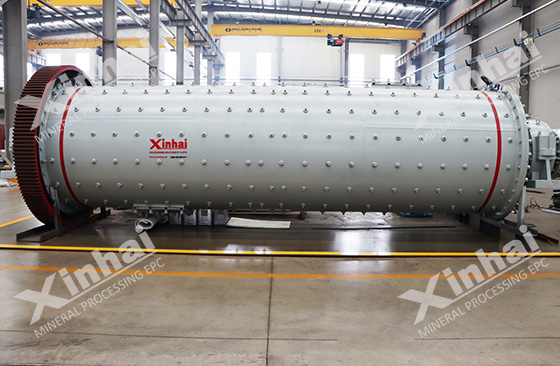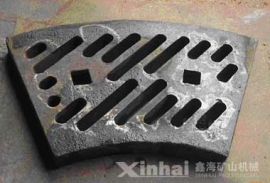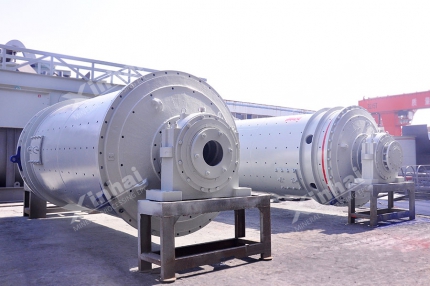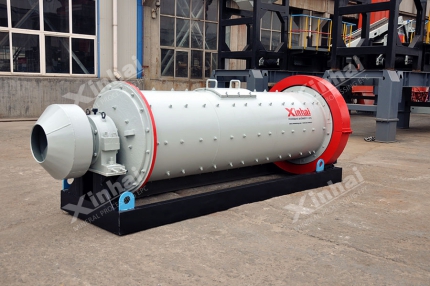Before raw ore is selected, it needs to undergo crushing operations to achieve the dissociation of the basic monomers of the mineral, thereby providing suitable selected ore particles for mineral processing. This is the preparation work for mineral processing and is also a key operation of the mineral processing plant. Since the investment in the infrastructure and production of the crushing and grinding workshop of the mineral processing plant accounts for a large proportion of the total cost of mineral processing, choosing an appropriate and reasonable crushing and grinding process is the top priority in the design of the mineral processing plant. There are many grinding processes commonly used at home and abroad. In production practice, each process has advantages and disadvantages. It is necessary to choose a process that has many advantages and disadvantages and is relatively simple and convenient in industrial production. The factors that affect the selection of the grinding process mainly include ore properties, equipment performance, energy and steel consumption, investment in process solutions, and production costs. The following will focus on these four parts to introduce you to how to choose a suitable grinding process.
Use the table of contents below to navigate through the guide:
01Ore properties

Ore properties include the physical properties of the ore (such as hardness, lumpiness, brittleness, and primary slime content, etc.), the structural composition of the ore, mineral composition, clay mineral content, and mineral embedding characteristics. The conventional crushing process can be applied to most ores, except ores with high mud content or high water content. The autogenous grinding process is sensitive to the structure, structure and particle size composition of the ore, and can only process ores with clear grain boundaries and solid rock composition. Therefore, when using the self-grinding process, mineral processing test analysis is required. When dealing with brittle ores such as tungsten or tin ore, over-crushing problems should be avoided during the grinding process. When dealing with clay ores, the semi-autogenous grinding process can effectively avoid problems such as crusher blockage and low screening efficiency.
02Grinding equipment performance

Different devices have their own fixed characteristics and are not the same. For example, the crushing ratio of a gyratory crusher is between 3-5, while the crushing ratio of a short-head cone crusher is between 4-8. Therefore, one crushing process is not enough to crush the raw ore to the grinding size. In addition to crushers, the same is true for grinding equipment. The particle size of the mineral products discharged by the rod mill is relatively uniform, and there is less over-crushing. The product particle size is generally 1-3mm. The particle size of the mineral products discharged by the overflow ball mill is relatively fine, and the general particle size is below 0.2mm, which is prone to over-crushing problems. The autogenous grinding machine can break the ore along its interface. When grinding the same ore, it can complete the monomer dissociation of the mineral in a relatively coarse grinding situation. It can be seen from the above that crushing and grinding equipment need to reach a certain particle size range of minerals to work efficiently. Therefore, when designing the grinding process, you should ensure that the process adapts to the product particle size range achieved by the equipment, etc.
03Energy and steel consumption of mineral processing plant

The crushing process in the mineral processing plant is one of the most energy-consuming operations, with electricity and steel consumption accounting for about half of the overall mineral processing cost. Therefore, reducing energy consumption and steel consumption is one of the ways to improve the economic benefits of the mineral processing plant. When designing and selecting crushing and grinding processes, consideration should be given to reducing energy and steel consumption levels.
04Investment and costs of process solutions
In addition to the above factors, the investment costs and production expenses of different options are also important factors in determining the grinding process. This factor is mainly reflected in the following aspects:
1. Process structure: Different grinding processes have different costs and production expenses. For example, when the power of the mill is the same, compared with the two-stage grinding process, the investment in one-stage grinding is higher than that of the two-stage grinding. Because one stage of the grinding process requires the installation of a feeding system and a storage system, its production cost is low.

2. Grinding methods: Commonly used grinding methods include autogenous grinding, semi-autogenous grinding, gravel grinding, rod grinding and ball grinding. Under the same production capacity, the investment in semi-autogenous grinding is lower than that of full-autogenous grinding.
3. Equipment specifications: The main purpose of gradually increasing the specifications of crushers and grinding equipment is to reduce infrastructure investment and production costs. However, in actual production, although large-sized mills do not have mechanical problems, they cannot achieve good grinding effects. Therefore, grinding equipment should be appropriately selected according to the design scale.

The above content is a brief introduction to the factors that affect the selection of the grinding process. The specific grinding process should be formulated after comprehensively considering these factors, so as to improve the processing efficiency and separation efficiency of the ore. Xinhai Mining recommends conducting mineral processing test to determine the properties of the ore, and customizing reasonable grinding and separation processes based on the test results to improve the production efficiency and production benefits of the mineral processing plant.


 marketing@ytxinhai.com
marketing@ytxinhai.com  0086 13810327080
0086 13810327080 






































































































 CHAT
CHAT MESSAGE
MESSAGE




.jpg)



